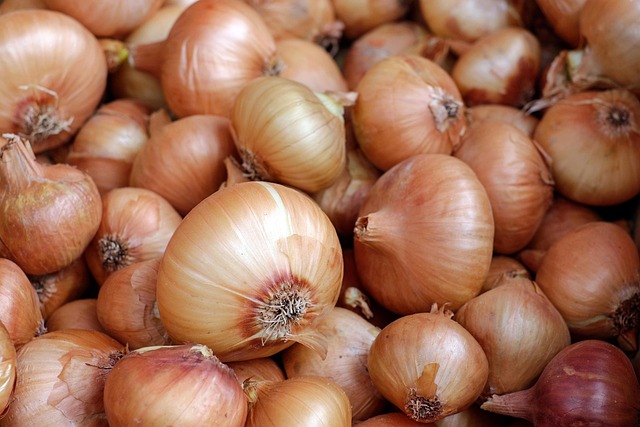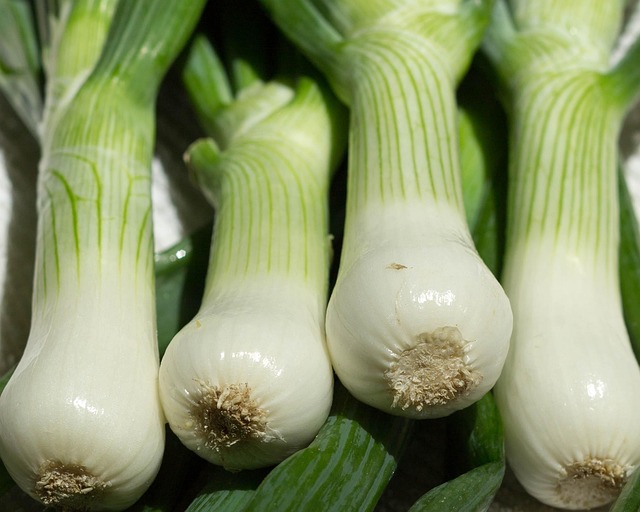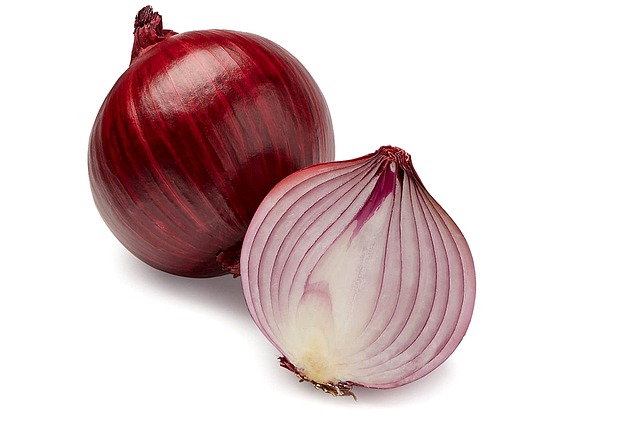
Brief Overview of Onions as a Staple Ingredient
Few pantry staples have withstood the test of centuries like the simple onion. Employed by cultures, cuisines, and families the world over, onions add flavor to our dishes to be sure, but also a formidable nutritional boost. Whether cooked in olive oil, chopped fresh in a salad, or slowly browned to sweet and syrupy perfection, onions are as adaptable as they are healthy.
Significance of Knowing Onion Nutrition
Though widely enjoyed for their flavor, few recognize the richness of their nutritional content. Onion nutrition is an area deserving attention, particularly in light of their health-promoting compounds, high content of vitamins and minerals, and possible disease-fighting capacity.
Purpose of the Blog Post
This blog post intends to peel away the layers both literally and metaphorically of onion nutrition. We’ll examine it all, from macronutrients to health advantages, onions’ impact on blood sugar, and how best to include them in your daily diet. Whether you’re a foodie, health-conscious individual, or merely curious about why onions are so unique, this guide is for you.
Nutritional Profile of Onions
A. Macronutrients: Carbohydrates, Proteins, and Fats
Onions have few calories but high-quality nutrients. A 100-gram raw onion serving has:
- Carbohydrates: ~9 grams
- Sugars: ~4.2 grams (not added sugars, natural)
- Protein: ~1.1 grams
- Fat: ~0.1 grams
Though mostly water content (approximately 89%), the rest of the nutrients in onions deliver a strong nutritional punch.
Micronutrients: Vitamins and Minerals
Onions are rich in a diverse spectrum of micronutrients, such as vitamins C, B6, and folate, and important minerals like potassium, calcium, and magnesium. These support everything from nerve function to bone integrity and immune response.
Caloric Content
Onions are extremely low in calories only 40 calories per 100 grams. This makes them an ideal option for those trying to maintain weight or control their calorie consumption but still wanting dense flavor and nutrition.
Health Benefits of Onion Nutrition
Antioxidant Properties
Onions contain a high amount of antioxidants, especially quercetin and sulfur compounds. These antioxidants combat oxidative stress in the body, which is associated with chronic diseases like heart disease and cancer.
Anti-inflammatory Effects
Quercetin is also a strong anti-inflammatory agent, which may aid in alleviating the symptoms of diseases like arthritis, asthma, and even inflammatory bowel diseases.
Heart Health Support

Various studies have associated the consumption of onions with enhanced heart health. Onions can help:
- Reduce blood pressure
- Lower cholesterol levels
- Enhance circulation
- Inhibit platelet aggregation
All these factors combined lead to a reduced risk of cardiovascular disease.
Vitamins Present in Onions
Vitamin C: Immune System Support and Skin Health
A medium onion contains approximately 12% of the daily recommended allowance of vitamin C, necessary for:
- Immune system boost
- Collagen development for healthy skin
- Healing of wounds and resistance to infections
B Vitamins: Energy Metabolism and Brain Health
Onions are rich in various B vitamins, such as:
- Vitamin B6 (Pyridoxine): Assists in energy metabolism and brain growth
- Folate (Vitamin B9): Requires for DNA repair and synthesis
Combined, these vitamins help in keeping the energy level steady, aiding mental acuity, and resisting cognitive impairment.
Folate: Importance for Cell Division and Pregnancy
Folate is responsible for:
Fetal development in pregnancy
Red blood cell development
DNA replication and repair
Pregnant women and women who are attempting to become pregnant can especially reap the benefits of onions as part of their diet since onions contain natural folate.
Minerals in Onion
Potassium: Role in Heart Health and Blood Pressure Regulation
Potassium is available in onions and is an important mineral responsible for regulating:
- Heart rhythm
- Blood pressure
- Muscle contractions
A lack of potassium may result in hypertension and cardiovascular complications.
Calcium: Importance for Bone Health
While not one of the primary sources, onions do count toward your daily calcium intake, essential for:
- Bone density
- Osteoporosis prevention
- Healthy nails and teeth
Magnesium: Benefits for Muscle and Nerve Function
Magnesium plays a role in more than 300 enzymatic processes in the body. Onion nutrition supplies a natural source of this vital mineral, helping with:
- Muscle function
- Nervous system health
- Energy production
Dietary Fiber Content
Role of Fiber in Digestive Health
Onions have both soluble and insoluble fiber, which are vital to gut health. Soluble fiber creates a gel-like substance in the gut, serving to:
- Feed beneficial gut bacteria
- Regulate bowel movements
- Avoid constipation
Effect on Satiety and Weight Control
Foods high in fiber such as onions create satiety, making you feel fuller for longer. This can lead to lower overall calorie consumption and healthy weight control.
Fiber Content of Onions
The principal fibers in onions are:
- Fructooligosaccharides (FOS)
- Inulin
These are prebiotic fibers that act as fuel for probiotics, resulting in a healthy microbiome.
Onions and Blood Sugar Control
Impact on Insulin Sensitivity
Research indicates that sulfur compounds in onions enhance insulin sensitivity, allowing cells to take up glucose better and reducing blood sugar levels.
Benefits for Diabetics
In individuals with Type 2 diabetes, the addition of onions can:
- Regulate blood glucose levels
- Decrease fasting blood sugar
- Enhance lipid profiles
Of course, onions should be added to—and not substitute for—medical therapy.
Glycemic Index of Onions
Onions possess a low glycemic index (GI) of approximately 10–15, which makes them suitable for people controlling blood sugar. They slowly break down into sugar in the bloodstream, preventing spikes and crashes.
Culinary Uses and Preparation Tips
Different Types of Onions and Their Nutritional Differences
There are numerous varieties of onions—each with somewhat varying onion nutrition profiles:
- Yellow onions: Rich in quercetin
- Red onions: High in anthocyanins and polyphenols
- White onions: Least flavorful but still worth eating
- Green onions (scallions): Useful for garnishes and fewer calories
Cooking Methods That Preserve Nutrients
To keep most of the nutrients:
- Light sautéing is preferable to deep frying
- Raw onions are best for keeping vitamin C intact
- Slow roasting adds flavor without destroying minerals
Steer clear of burning onions at high temperatures, as it can diminish their antioxidant potential.
Adding Onions to a Balanced Meal
The following are some suggestions:
- Use raw onions in salads and wraps
- Incorporate caramelized onions into grain bowls
- Puree onions into soups, stews, and sauces
- Roast vegetables with onions as a side dish
Possible Allergies and Side Effects
General Allergic Reactions
Though uncommon, some individuals may develop onion allergies, producing the following symptoms:
- Skin rashes
- Stomach cramps
- Breathing trouble
Always consult a health care provider if you suspect a food allergy.
Bigestive Troubles Associated with Onion Use
Onions are rich in FODMAPs, which ferment in the intestine and lead to bloating or discomfort, particularly for people with IBS (Irritable Bowel Syndrome).
Tips for Sensitive People
If you’re sensitive to onions:
- Begin with minimal amounts
- Attempt cooking them so that FODMAPs are reduced
- Try onion-flavored oil with less fiber
Conclusion
Summary of the Health Benefits of Onions

When it comes to vitamins and minerals, fiber and antioxidants, onion nutrition cannot be beat. These pantry staples nourish the heart, balance blood sugar, and support digestive health.
Invitation to Incorporate Onions into Daily Meals
Regardless of whether you are roasting, consuming raw, or including them in your favorite recipes, onions are worthy of inclusion in your daily diet. Their health benefits are simply too important to go unattended.
Conclusion on the Place of Onions in a Healthy Diet
At the intersection of flavor and function, onions are more than just a culinary building block, they’re a nutritional powerhouse. Embrace onion nutrition as part of your journey to a healthier, tastier lifestyle.
